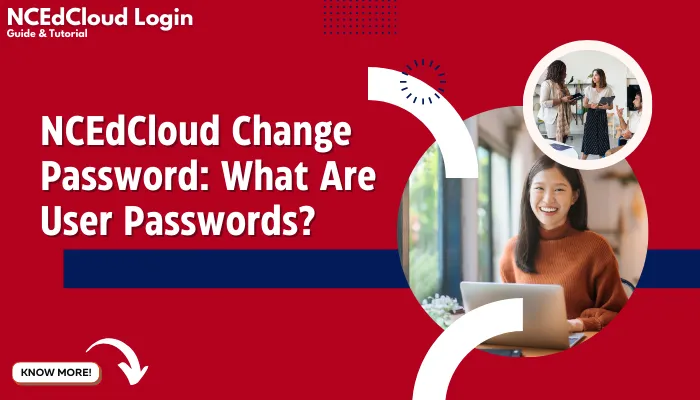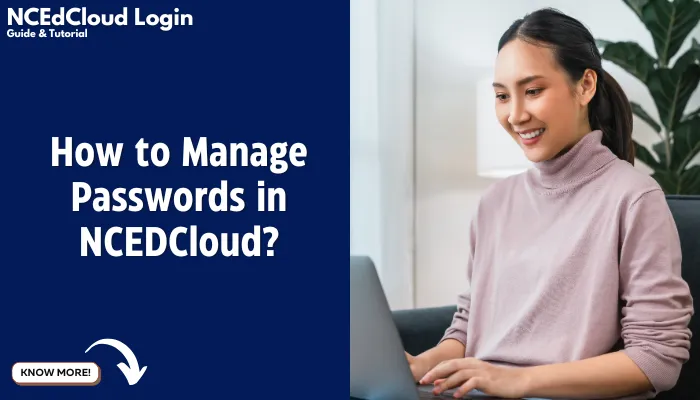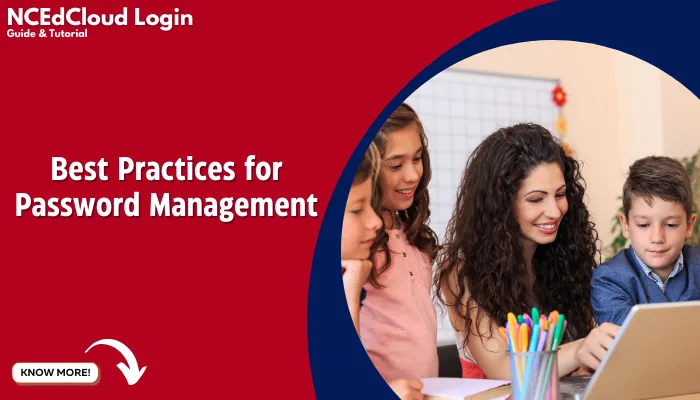NCEdCloud change password is a critical aspect of securing your online educational resources. As digital platforms become increasingly integral to our learning environments, understanding how to manage your passwords effectively is essential for safeguarding personal information and ensuring uninterrupted access to your account.

This article will explore the significance of password security, the policies surrounding password expiration, and provide practical steps to help you navigate the process of NCEdCloud change password online seamlessly.

NCEdCloud Change Password: What Are User Passwords?
User passwords are letters, symbols, and or numbers that are combined to form words which are utilized as a secret to access a user’s account in the NCEDCloud.
Purpose:
- Authentication: It confirms the user’s active participation in a logging in to his account.
- Authorization: Defines which privileges and barriers the user has while interacting with the system according to the role assigned.
- Security: Provides exclusion to unauthorized persons from accessing sensitive information and other resources, in the NCEDCloud.
Importance of maintaining password security:
- Data Protection: The strength of a password is the major determinant of the amount of unhindered access a person can gain to the user accounts.
- Account Hijacking: Malicious actors can be able to hijack the user accounts when the passwords are weak.
- Compliance: There are particular password security procedures that many firms need to meet as a condition in the industry that they operate.
By regularly updating your NCEdCloud change password online, you can prevent unauthorized access and ensure compliance with security policies.
Password Expiration Policies
It is likely that NCEDCloud has a password expiration policy so as to ensure that the password have not changed and that the same ineffective passwords are not continued to be used by the users to log into their accounts. This policy’s rule is changing your password every so often to suit the need for the change.
Monitor Password Change Reasons:
It is very clear from the accompanying chart that the regularity at which password changes occurs is dependent on the risk profile of the organization as well as the organizational policies. Those policies do however limits the time frames to:
- Once a Month: Offers a greater degree of security, but can be troublesome for the end-user, whom HAS been assigned this password.
- Once a Quarter: Good enough security with a more pleasing impact on the users.
- Once a Year: This can be limiting in terms of security coverage, but in most cases, end-users request this due to minimization of effort and time taken in administrative work.
In general, password lifetime policies have been empirically shown to work for three primary reasons:
- Prevention of password reuse: Passwords accumulate over time due to reasons of security oversights and can prove problematic due to how easy it becomes to hack passwords.
- Force an improvement of password strings through regular changes: password history entails any previous passwords thus hay can restrict the complexity of passwords; forcing a user to change password history can then result in improvement of password strings.
- Limit the risk of breach by audit: Once hack has occurred, the new password change function can help ‘resolve’ this breach and further assist in understanding how much substance was actually hacked regarding whether sensitive material was obtained.
Risks of Not Updating Passwords
- Account Hijack: Using the non-active accounts can prove a treasure for the hackers due to how weak the passwords possessed can be thus making theft of the account swift and efficient.
- Individual account hysterectomy: If a single account is lost all the general information within this single account becomes compromised.
- Non-compliance due to disobedience: Any breach or disobedience regarding password policies can lead to extreme consequences such as being blacklisted on management systems or risk management systems.
You should be aware that the specific password expiration policy set by NCEDCloud might differ from the examples illustrated above. For appropriate information regarding how to NCEdCloud change password online, users should refer to the platform’s documentation or seek help from the IT administrator.

How to Manage Passwords in NCEDCloud?
Effectively managing your NCEdCloud change password process is key to keeping your account secure and up-to-date.
How to Set Up a Strong Password:
- Mix It Up: Combine lower case letters, upper case letters, numbers and symbols in your password.
- Get Rid of Almost All Personal Info: Don’t include information that can be deduced easily like your name, date of birth or pets.
- Twelve is the Magic Number: Set a target of 12 characters or more for your password.
- Avoid Common Patterns: Don’t use sequences of characters like “123456” or “qwerty.”
- Consider a Password Manager: Ask if you need a password manager in order to save to create strong passwords available.
Where Passwords are Securely Stored:
- Password Management: Choose a well-known password manager that is encrypted and has features such as password strength and autofill. Passwords should not be divided for easy guessing.
- Physical Note Taking of the Password is Discouraged: Do not ever write your passwords anywhere in plain form.
- Confidentiality on Passwords: Passwords should only be known by you and should not be circulated among other people.
How to Change Passwords in advance about to be expired:
- Go to NCEDCloud Welcome Page.
- Access Account Settings: Find the area dealing with changing password or your account details.
- Proceed to password reset: Take the sideways to the end by working as per the suggestions available to reset the password.
- Northern Australia and New Zealand: Australian internet users are asked to input their current password and select a new strong password of their own making.
- Confirm Changes: Complete any further actions that are necessary to confirm the change of password.
By following these steps, you can easily manage your NCEdCloud change password and ensure the safety of your account.
What to Do If Your Password Expires?
If your NCEdCloud change password process is interrupted by an expired password, follow these recovery steps to regain access.
Recovering an Expired Password:
- Password Recovery: Look for password recovery steps embedded within the NCEDCloud website where you usually log in.
- Provide Required Information: You may be required to enter your username, email address, or other determinants as identification.
- Follow Instructions: Follow the prompt to change the password which would include receiving a code by text or answering security question.
Resetting Passwords by NCEDCloud Platform:
- Login NCEdCloud: In case you remember your password, log into your account and go to settings, change the password.
- Password Reset: If you don’t remember your password, follow the steps that were mentioned previously to reset it.
Common Issues and Troubleshooting:
- Incorrect Password: Go through your password again for editing mistakes or ensure that you are using the password that was set correctly.
- Account Lockout: If enough incorrect attempts are made to put in a password, there is a possibility that your account will be temporarily locked. You should check the instructions provided to these steps to unlock your account.
- Technical Difficulties: If a user finds himself or herself unable to change their password due to recovery of this password, then they ought to contact NCEDCloud in order to receive further assistance.
If you comply with these guidelines, it will be possible for you to manage your passwords in NCEDCloud and ensure the safety and security of your account.

Best Practices for Password Management
Implementing strong NCEdCloud change password practices is crucial for safeguarding your account and personal information.
What Makes a Strong Password:
- Complexity: Please combine letters, numbers, and special characters and not rely on words.
- Length: Aim for 12 character long passwords at least.
- Personal Information: Avoid using readily available information such as someone’s name or pet’s name, birthday etc.
- Common Patterns: Avoid Omit character strings like sequences of numbers which are easy to recall or common.
- Uniqueness: Each unique login should have its own unique password.
How Does 2FA work:
Two-factor authentication was designed to make online accounts safer by requiring a combination of two methods:
- Knowledge: This is often your password.
- Possession: This can be a pin generated, a physical key, or a biometric such as a fingerprint.
It’s almost impossible for anyone without permission to access the desired account due to an additional layer of password protection enabled by 2FA, which can help prevent issues like NCEdCloud authentication failed errors.
Why Regular Password Changes and Audits Matter:
- Preventive Measures: Changing your password often will ensure that your old or compromised password is no longer in use.
- Audits: Such measures allow standardized control over policies governing your password security and assist in improving judgment.
- Compliance: Some companies have to impose specific password creation policies in order to be in line with the necessary industry regulations, and standards.
Implementing these recommendations best practices will greatly enhance the security of the NCEDCloud account and safeguard personal information.
FAQs
Here are some frequently asked questions to help you manage your NCEdCloud change password process efficiently.
1. After how long should I change my password?
There is no fixed period within which all users NCEDCloud passwords must be changed. However employees remain patrons of a quarterly or 90-day period while students have the option of an expired feature.
2. What do I do if I forget my password?
In case you forget your password, the NCEDCloud login page includes the option, “Forgot Password” or “Password Recovery.” It is possible that other relevant information, such as a username or email address, or answers to the security questions, is needed to send the code or instructions.
3. What measures will be taken if my password is compromised?
There are some limits on the number of failed attempts for passwords that security has incorporated in NCEDCloud such as the timeouts or lockouts after reaching a certain threshold. These may include:
Account Lockout: To enable further protection after a configured maximum of login fails, it might enable account being temporarily locked until server login is enabled again.
Password Reset: Once you are able to log in after an account lockout, you will change your password , and new security questions will possibly be chosen by you
Notification: By any chance, if NCEDCloud detects unusual activity associated with your account, you will receive a notification to change your password.
By understanding these FAQs, you can ensure smooth NCEdCloud change password online management and enhance your account’s security.
Conclusion
In conclusion, understanding how to NCEdCloud change password is crucial for maintaining account security. Regularly updating your password helps protect against unauthorized access and ensures compliance with security policies.
If you ever need to NCEdCloud change password online, following the recovery and reset procedures outlined in this guide will help you manage your passwords effectively and safeguard your personal information.
